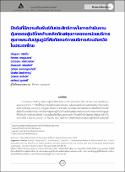บทคัดย่อ
การถ่ายโอนภารกิจด้านการคุ้มครองผู้บริโภคให้แก่องค์การบริหารส่วนจังหวัด ได้มีการดำเนินการอย่างต่อเนื่องตามแผนกระจายอำนาจ การวิจัยนี้มีวัตถุประสงค์เพื่อประเมินการดำเนินงานคุ้มครองผู้บริโภคด้านผลิตภัณฑ์สุขภาพในประเด็นเครือข่ายสนับสนุน ความรอบรู้ การปฏิบัติ ทัศนคติ ความพึงพอใจ ความพร้อม และประสิทธิภาพ พร้อมทั้งค้นหาปัจจัยที่สัมพันธ์กับประสิทธิภาพในการดำเนินงานคุ้มครองผู้บริโภคด้านผลิตภัณฑ์สุขภาพของหน่วยบริการสุขภาพระดับปฐมภูมิที่สังกัดองค์การบริหารส่วนจังหวัด รวบรวมข้อมูลโดยใช้แบบสอบถามส่งทางไปรษณีย์ไปยังกลุ่มตัวอย่างที่สุ่มอย่างง่าย ในระหว่างวันที่ 1 มิถุนายน 2566 ถึง 30 กันยายน 2566 กลุ่มตัวอย่างเป็นผู้รับผิดชอบงานคุ้มครองผู้บริโภคด้านผลิตภัณฑ์สุขภาพของหน่วยบริการ จำนวน 404 คน ส่วนใหญ่เป็นเพศหญิง (ร้อยละ 71.0) มีอายุเฉลี่ย 38.1 ปี (SD = 9.98) จบการศึกษาสูงสุดระดับปริญญาตรี (ร้อยละ 83.7) ดำรงตำแหน่งนักวิชาการสาธารณสุข (ร้อยละ 54.5) ได้รับการสนับสนุนจากองค์การบริหารส่วนจังหวัดในระดับปานกลาง คะแนนความรู้เฉลี่ย 5.9 (SD = 1.73) จากคะแนนเต็ม 10 คะแนน ระดับความรอบรู้เฉลี่ย 3.79 (SD = 0.85) จาก 6 คะแนน ระดับความพร้อมเฉลี่ย 13.8 (SD = 6.08) จาก 20 คะแนน ระดับการปฏิบัติเฉลี่ย 2.68 (SD = 1.15) จาก 5 คะแนน มีทัศนคติเชิงบวกเฉลี่ย 4.12 (SD = 0.56) จาก 5 คะแนน ความพึงพอใจต่อการดำเนินงานกับเครือข่ายเฉลี่ย 3.72 (SD = 0.75) จาก 5 คะแนน ระดับประสิทธิภาพการดำเนินงานเฉลี่ย 3.71 (SD= 0.82) จาก 5 คะแนน และปัจจัยที่มีความสัมพันธ์กับประสิทธิภาพการดำเนินงานคุ้มครองผู้บริโภคด้านผลิตภัณฑ์สุขภาพที่มีนัยสำคัญทางสถิติ ได้แก่ ความพร้อมมากระดับ 16 กิจกรรมขึ้นไป (ORadj= 6.84) ความพึงพอใจมาก (ORadj= 3.46) เครือข่ายสนับสนุนมาก (ORadj= 3.11) และมีความรอบรู้ระดับเชี่ยวชาญ (ORadj= 2.63)
บทคัดย่อ
The role of health product consumer protection has also been transferred to the primary care unit (PCU) of the provincial administrative organization (PAO). This research aimed to evaluate health product consumer protection role of the transferred PCUs, including network supports, health literacy, practices, attitudes, satisfaction, readiness, and to identify factors associated with their role efficiency. A self-adminis-tered questionnaire was used to gather information from 404 officials responsible for consumer protection in the PCUs. Most of the respondents were female, aged 38.1 years (SD = 9.98), 83.7% had bachelor’s degree education, 54.5% were in technical public health job titles. The PAO support was at a moderate level. Out of a full score of 10, the mean knowledge score was 5.9 (SD = 1.73); the health literacy score was 3.79 (SD = 0.85) out of 6; the readiness score was 13.8 (SD = 6.08) out of 20. From the full score of5, their consumer protection activities were low with a mean score of 2.68 (SD = 1.15) out of 5; but with positive attitude (mean = 4.12, SD = 0.56); with satisfaction 3.72 (SD = 0.75); and the efficiency 3.71 (SD= 0.82). The factors associated with efficiency of health products consumer protection were readiness(ORadj= 6.84), satisfaction (ORadj= 3.46), networking and supports (ORadj= 3.11), and health literacy (ORadj= 2.63)


